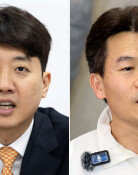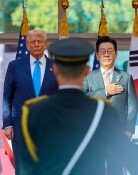Koreas Foreign Energy Needs Critical
Koreas Foreign Energy Needs Critical
Posted June. 20, 2006 03:00,
Korea may have the worlds lowest self sufficiency rate in terms of energy.
At a discussion on overseas energy development held on June 12 at the Gwacheon Government Complex, Seoul National University engineering professor Kang Joo-myung said that it is a miracle that a country that is so reliant upon overseas for its energy has the worlds 12th largest trade volume.
Koreas crude oil self sufficiency rate is 4.1 percent, which is shamefully low compared to over 50% in many advanced countries. Crude oil self-sufficiency refers to the proportion of imported oil supplied through self development. With the high oil prices of late, securing energy resources has become nationally important. Against this backdrop, many public and private sector companies have embarked on plans to secure oil. The government belatedly realized the seriousness of the issue and has been showing a keen interest in developing resources overseas.
Korean Companies Reach Outward-
SK, Koreas largest oil refiner, made a series of announcements on June 12 and 15 to develop new oil fields. The company has joined projects in the North Sea of Britain and in Madagascar in East Africa, in the form of share buying.
SK has secured 420 million barrels of crude through overseas oil development so far, meaning that it can extract 420 million barrels within the contract period. SK plans to invest 338.5 billion won on overseas resource development this year, which is more than 200 billion won higher than last years 128 billion won.
Other companies, including Samsung Corporation, LG International, and Daewoo International, are actively developing resources as well. LG International acquired 45 percent of the shares of ADA field block in southwest Kazakhstan and is conducting an exploration project with Korea National Oil Corporation (KNOC) to assess the amount of oil in the oil field. ADA field block is an on-land block that is estimated to hold 170 million barrels of oil. The exploration results will be out as early as late this month.
KNOC is working in partnership with Samsung Corporation, LG International, and SK to win one of the lots of the Jambil oil block in Kazakhstan. The oil block is estimated to hold at least 900 million barrels of oil and is at the center of attention from developers around the world.
Korean companies have 76 ongoing projects in 28 countries and are expected to tremendously increase investment in overseas resource development from 1.11 billion dollars of last year to about 3 billion dollars this year. The government has joined in the efforts. Vice Minister of Commerce, Industry, and Energy Lee Won-gul said last week that [The government] is planning to purchase an overseas oil field that holds 500 million barrels of oil at around 7 billion dollars.
Korea Needs an Oil Giant-
Many European leaders have a crude self sufficiency rate of over 50 percent, despite little or no domestic oil production. Frances figure is 93 percent, Spains 56 percent, and Italys 51 percent. These countries have one thing in common. They each have a global oil giant: France has Total, Spain has Repsol, and Italy has ENI. Governments of these nations took the lead in mediating M&As and providing funding for these companies to grow in size.
The Korea Energy Economics Institutes Jeong Woo-jin said, Korea desperately needs active support measures such as financing and technology human resource development for companies to grow into oil giants. Korea may well learn from the experience of Germany and Japan. The two countries focused on exploration projects rather than raising globally competitive oil giants at home. Their crude self sufficiency rates remain at around 10 percent.
Sang-Soo Kim Chang-Won Kim ssoo@donga.com changkim@donga.com







